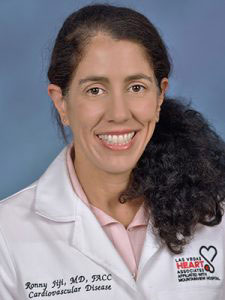
Shadi Daoud, MD, FACC
With high rates of obesity, high blood pressure, high cholesterol and smoking, younger and younger patients are at risk for heart disease. According to the CDC, nearly half of all Americans have at least one of the top three risk factors for heart disease, listed above and more could be at risk.
Ronny Jiji, MD, FACC, board-certified in internal medicine, cardiovascular disease and adult congenital heart disease and Shadi Daoud, MD, FACC, board-certified in cardiovascular disease, advanced heart failure and transplant cardiology and nuclear medicine both at Las Vegas Heart Associates weigh in on lifestyle triggers that can increase young people’s risk for heart disease over time and what can be done for better, overall health.

Ronny Jiji, MD, FACC,
“It’s no longer affecting only the aging population, I see younger patients coming to our practice needing help in managing their health in an effort to reduce future risk of heart disease,” said Dr. Jiji. “At Las Vegas Heart Associates, we counsel our patients on everyday lifestyle changes that they can make to improve overall health as well as cardiovascular health,” said Dr. Daoud.
Regardless of age, the following can contribute to development of heart disease:
High blood pressure (HBP)-Also known as hypertension, can be attributed to being overweight, having a diet high in sodium, lack of exercise, tobacco, alcohol, caffeine/energy drinks as well as stress. “If it remains undiagnosed or uncontrolled, high blood pressure can increase your risk for stroke, heart attack, kidney disease, congestive heart failure and arrhythmias.” said Dr. Jiji.

Shadi Daoud, MD, FACC
High Cholesterol-Common contributing factors include dietary choices, obesity, lack of exercise as well as genetics. “Chronically elevated cholesterol levels can lead to blocked arteries which can restrict blood flow to vital organs and are a major cause of stroke and heart attack,” said Dr. Daoud.
Smoking-“If you smoke, it is important to evaluate your reasons for smoking and the impact it can have on your health. We always recommend patients try their best to stop smoking, and if they need help to provide resources to help them quit,” said Dr. Daoud. “It’s important to discuss with your physician or healthcare provider the options that are available to you,” Dr. Daoud says.
Diabetes-Diabetes can cause chronic inflammation and promote plaque buildup in arteries, and is a leading contributing factor to heart disease as well as kidney disease. Tackling diabetes in our society often requires not only medications but a commitment to making lifestyle and dietary modifications.
Lack of exercise-“Exercise has been proven to help with circulation, lowering cholesterol levels and high blood pressure which in turn can reduce your risk of heart disease and stroke,” said Dr. Jiji. “Moving your body for at least 30 minutes a day in the form of cardio exercise has tremendous health benefits and can also reduce the risk of type 2 diabetes, cancer and heart disease. It is also important for preventing osteoporosis and keeping lean muscle mass,” Dr. Jiji says.
Before you start any new exercise routine, it’s important to speak with your doctor to discuss your options.
Poor Diet-Diets containing large amounts of processed food, high sodium, high carbohydrate and high sugar can contribute to high blood pressure and cholesterol. “A common risk factor I see across the board are diets high in saturated and trans fat with added sugar,” said Dr. Daoud. “Obesity can certainly play a role in increasing your risk of heart attack, stroke and congestive heart failure, so it is imperative we manage those with a proper diet for prevention,” said Dr. Daoud.
“If these health problems go untreated, long term consequences may include heart failure that could have been prevented with the right lifestyle changes made early on,” said Dr. Daoud a local advanced heart failure expert in the community. “The pandemic has had a profound effect on people’s ability to exercise or be active, has caused significantly more stress, depression and anxiety. This, associated with the increased use of alcohol and drugs, will eventually cause an even more drastic increase in heart disease as well,” mentioned Dr. Daoud.
An important piece of advice is to not delay care, Dr. Daoud said, “We urge people at risk to get checked earlier instead of waiting for symptoms since cardiac risk factors are silent, you shouldn’t wait for the symptoms.”
American Heart Health Month begins every February across the country to promote heart health and bring awareness to this devastating disease. According to the CDC, one person dies every 36 seconds in the United States from cardiovascular disease. Heart disease is an umbrella term that refers to a variety of conditions and events that affect your heart including but not limited to; heart attack, coronary artery disease, heart valve disease, heart rhythm problems (arrhythmia), stroke and heart failure. To learn more about Dr. Jiji, Dr. Daoud and Las Vegas Heart Associates, visit the website at www.LasVegasHeartAssociates.com.
Prevention is key for heart health month this February. Learn about risk factors and ways to stay heart healthy all year.